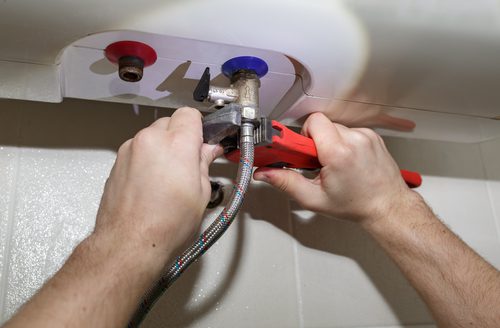Professional Water Heater Repair in Houston
Your water heater is the most used plumbing appliance in your home, as it operates around the clock, maintaining the temperature of your hot water. Your water heater never sleeps, keeping an unblinking eye on its only task, providing your family with plenty of hot water for years to come. Some boilers will stumble along the way, as they succumb to a lack of proper maintenance, advancing age, and hard water conditions from the day it’s installed.
Learn About Hot Water Heaters:
- What Are the Signs Your Hot Water Heater is Broken?
- What Should I Do If I Need Hot Water Heater Repair?
- How Long Should My Hot Water Heater Last?
- What Does Hard Water Do to a Hot Water Heater?
- Why Should You Drain Your Hot Water Heater Tank?
- How Much Does it Cost to Fix a Hot Water Heater?
- Electric Water Heater Repair
- Gas Water Heater Repair
What Are the Signs Your Hot Water Heater is Broken?
You don’t have to be a plumbing whisperer to recognize when your water heater is calling out for help. The most common symptoms of a water heater in poor health are reduced hot water temperatures and hot water running out too quickly. Long, hot showers become a distant memory, and not having enough hot water to do laundry or wash dishes becomes more than an inconvenience.
In gas-powered units, the most common point of failure is the thermocouple, which shuts off the gas supply when the pilot light goes out. Before calling for help, you can attempt to reignite the pilot light by following the directions on the unit itself. If the pilot light is unable to remain lit, chances are you have a bad thermocouple. Read more about gas water heater repairs below.
In electric systems, the most common cause for a water heater service call is faulty heating elements. These elements use electrical energy to conduct heat directly into the water, unlike a gas-operated unit that uses an open flame for the same task.
Electric heating elements are submerged in a tank of water for their entire lifespan; thus, they are bound to eventually start to erode, reducing hot water output and efficiency. Electric furnaces are also less energy-efficient than their gas counterparts, often taking twice as long to heat a tank of water. Read more about electric water heater repairs below.
What Should I Do If I Need Hot Water Heater Repair?
The first rule is: don’t panic!
Waking up to a “no hot water” situation is undoubtedly frustrating, but it isn’t the end of the world. Check the other faucets in the house to see if there is hot water anywhere else, or if the problem is isolated to one room. If the lack of hot water affects the entire home, check the circuit breaker for the water heater. On a gas-type furnace, make sure that the pilot light is lit.
How Long Should My Hot Water Heater Last?
On average, a tank-type water heater has a lifespan of between 8 and 12 years. Without regular maintenance, however, many units will require some form of service in the first five years of use, and replacement in as little as seven years.
Residential tank-type boilers store between forty and seventy gallons of hot water at an average temperature of 120 – 140 degrees. The repeated heating and cooling cycles of the water cause the steel tank to expand and contract. This repetitive flexing of the steel begins to create pinhole leaks along the welded seam of the tank, and once your tank starts to leak, it’s a “game over” situation. You’re going to have to replace it.
What Does Hard Water Do to a Hot Water Heater?
No one needs to remind a Houston area homeowner about the effects of hard water on everything from our dishes to our skin and hair. Most folks don’t know about the damage that hard water does to our plumbing appliances, particularly our water heaters.
Moving parts in our faucets and toilets are worn down by the tiny mineral particles in our water supply, causing leaks and premature wear and tear. In water heaters, it’s the parts that don’t move that are more likely to suffer the effects of hard water.
Why Should You Drain Your Hot Water Heater Tank?
The key to improving your water heater’s efficiency, performance, and longevity is to have regular maintenance service performed. The steel tanks used are adversely affected by hard water sediment that collects at the bottom of the storage tank. Over time, this build-up starts blocking the transfer of heat from the gas burner to the water in the tank.
By having a regular maintenance service performed, including the draining of the tank, the sediment build-up is flushed out of the unit. Having this service performed at least once a year can increase your heater’s efficiency by as much as 15% and double the lifespan of the tank by preventing premature corrosion.
How Much Does It Cost to Fix a Hot Water Heater?
While this is one of the most common questions our customer service reps are asked, there is no reliable method of predicting the cost of service. Price can range from as low as $150 to replace a faulty thermocouple, up to $1,000 for a complete overhaul. If your water heater is older than seven years, and the cost of your service estimate is over $500, it might be time to consider replacing it.
Electric Water Heater Repair
7the tank. Both issues can be quickly and inexpensively resolved with an electric water heater repair in Houston service call from Nick’s Plumbing!
- There’s just NO hot water!!!
First, don’t panic. No hot water is often a sign of simple issue like a blown circuit breaker, which a homeowner can check for themselves. Sometimes, in an older unit, it means the heating element in your electric water heater has failed. If the circuit breaker checks out, and you still have no hot water, book a service call with Nick’s Plumbing.
Gas Water Heater Repair
How Do I Know If I Need a Gas Water Heater Repair in Houston?
Here are a couple of common symptoms that may indicate that you need a gas water heater repair in Houston service call, a bit about what they mean, and what you can do to
Symptom: No Hot Water
What to Check: Make sure the pilot light for the water heater is lit. If the pilot is not lit and will not re-light, check to see if the other gas appliances in your home are functioning. If your gas stove or fireplace isn’t working as well, your gas service may have been interrupted.
What it Means: Pilot lights are easily blown out by drafts in gas water heaters installed close to the ground. The thermocouple device will automatically cut off the gas supply without the presence of a pilot light, so you may not smell gas if your pilot light has gone out.
What to Do: If you cannot re-light your pilot light, or it will not stay lit, this may indicate a problem with the thermocouple or the gas valve itself. Either of these conditions will require a gas water heater repair in Houston appointment to assess your unit.
Symptom: Hot Water is Not Hot Enough
What to Check: First, check the temperature setting for your gas water heater. The United States Department of Energy recommends a water heater temperature setting of 120 degrees Fahrenheit. You can use a regular meat thermometer to check your hot water temperature, hold it in the hot water stream for two to three minutes.
What it Means: Water that is not hot enough can have a variety of causes ranging from a defective thermostat, a clogged vent, or a broken dip tube that leaves the cold supply water at the top of your tank where the hot water outlet is located, instead of sending it to the bottom of the tank.
What to Do? Open the electrical access panel on your water heater (if present) with a screwdriver. There will be a thermostat that you can usually adjust either by hand or with a small screwdriver to the temperature you desire. Wait three hours and check the temperature of your hot water again. If it hasn’t changed or is still lower than desired, it’s time for a gas water heater repair.
Symptom: Rusty Colored Hot Water
What to Check: Brown water coming out of any faucet indicates the presence of rust. Sometimes, as older galvanized pipes break down, they release pockets of rust that can temporarily discolor your water. If only your hot water is rusty, chances are the anode rod in your gas water heater has gone bad.
What it Means: Your gas water heater tank is made of stainless steel and as a metal water storage device, is susceptible to rust. The steel is infused with a glass coating to slow down corrosion, but that lining deteriorates over time allowing rust to form. A sacrificial metal rod is placed in the water heater tank, to which all rust in the tank will adhere. The anode rod is dissolved over time by the rust, and when it becomes too rusted to do its job, you need a gas water heater repair in Houston service call to replace it.
What to Do: When the anode rod has given up the fight, there isn’t anything the homeowner can do, except for hiring a licensed, experienced plumber for your gas water repair in Houston.
Nick’s Plumbing Service has been specialists in all aspects of gas water heater repair in Houston, as well as gas water heater maintenance and gas water heater installation since 1979. Our licensed and experienced plumbing technicians are available for any gas water heater issue you have and we offer professional estimates and recommendations for all water heater repair, replacements or installations.
Call the Experts at Nick’s
The professional plumbing technicians at Nick’s Plumbing Service have been Houston’s water heater repair experts since 1979. We also offer estimates and second opinions on any maintenance or replacement service your system may need.
Call us today, we’re on the way!
More on Water Heater Repair on The Potty Mouth Guys Show
Nick’s Plumbing Live Video Transcription:
On today’s show. It’s all about water heater repair in Houston.
I’m John Eccles, Richard Saad. We’re coming out of the hardest months, which is called winner for water heaters. That’s right. So when do they work the hardest? It’s the winter now we’re coming out of that now is a good time to pay attention to your water heater and get things looked at before it hits the summertime. That’s right. You agree? Oh yeah. Just came out of really stressful kind of time. It worked the hardest. Yeah. Right. Now’s the time to look at it. That’s it, right John in your attic, in your attic and you grow. That’s exactly right. So there’s not a lot of components that can go wrong with a tank type water heater. Right? Whether that be gas or electric. So what we’re going to discuss today are some of these components that can go out that can make a difference on how it heats your water and when do you need some help? Pretty simple, right? Pretty simple. I try. So what’s the largest component of a tank? Water heater. It’s pretty simple. They’re actually the tank, the tank. Ah, yeah. That’s worth no money. So that, that is the largest component, right? It makes up the bulk of the size of the unit and what’s going on. And basically just a giant storage tank that’s holding your water, you know, uh, you know, for about the past 60 years, these things have been manufactured the same as they are right now, which is going to be, you know, a stainless or not stainless steel cylinder, carbon steel, carbon ugly that is normally coated in glass on the inside to help prevent some of the erosion or not erosion, corrosion. Hello. Yeah. Yeah. Water erodes and corrodes. Right. Well, you know, so the biggest problem with that manufacturing process though is because manufacturers want to do what they want, things to be cost effective and sometimes that glass infusion isn’t evenly coated, so it leaves some weak spots in the tank and that’s where you can run into some problems and you don’t know that because no one gets to see the inside of it before it’s right before it’s putting it all welded up together.
Yeah. It’s all insulated on the outside and it’s got this nice pretty jacket, right? Yeah. With two or three inches of insulation depending on which unit you get. So you have no idea what that looks like to dry and the tanks, you know, I guess it goes good to say that they come in different sizes, right? You get a 40 to 50. Some of them are 75. I had you can still get thirties if you wanted one. Those are all gallons we’re talking about. Um, but back to the spots, you know, the, the, the uh, corrosion part, right. That just leads into the next part. So because of that ability to corrode from the inside out, what’s the next part that really helps out with that? The anode Rod, the anode Rod. That’s where some money, absolutely. That’s definitely worth some money cause I’m sure the customers aren’t really sure what that is.
I would say most people have not heard about that. Okay. So what is it, man? It’s probably, um, well obviously it’s a very important part of your water heater and all it is is it’s a carbon steel rod. That’s caked with, or I’m sorry, with built around aluminum or magnesium. Right? And the reason why that is, is those metals or less reactive than the steel that the actual cylinder is made out of try, right? And when we’re talking about water and the minerals and the hardness of water and how it attacks things, right? Normally it goes after a less reactive metal versus the more reactive metal first. So in Houston water, which is not the best water in the nation, right? Uh, we want, or the manufacturers want the water and the minerals and stuff that’s going to corrode that tank to attack that anode Rod.
And a lot of people in the business, and you’ll see it online, they’ll talk about, it’s the sacrificial animal rod, simplistic terms, it’s gonna eat that rod first before it eats the tank. I try. So if you don’t check that rod at intervals, right, and it’s already gone, then the water’s going to start attacking the tank. Try and your tank is not going to last as long. And that’s when you hear people in the Wa, uh, that have water heaters in the attic. And all of a sudden water’s coming down. One story, two stories or three stories, like they’re building over here in the heights and it starts traveling downwards. Well, you’re an know Rod’s gone and try more than likely and it ate the tank. So that’s a very important piece to a water heater. Absolutely. And that needs to be checked. Now as a homeowner, are you checking that personally?
Yeah, me either. No, not doing it. You need to call somebody to do it. It’s actually not easy to take that part out and to check it. Plus as a homeowner, we don’t really know what we’re looking at. That’s right. Yeah. How do I know if it’s bad, Adam? We not know of. It’s bad. So very important that that gets checked at certain intervals of, of the life of this water heater. Yeah. Right. Yeah. That can really actually help do a life expectancy. That’s right. Yeah. So what else does water attack that’s inside that tank? So this is going to be a different one because people aren’t going to expect it, right? I mean, right. You were actually talking about this earlier dip tubes. Yeah. So what is the dip tube? Simplistic terms. It’s made out of plastic, right? Right. Polypropylene to be exact, but let’s just call it plastic a plastic, right?
So this is the tube that goes from the top of the water heater and delivers cold water to just below the burner. Or I actually be just above the burner assembling and it heats the water and delivers that cold down there. Try it. So it’s taking the cold water to the bottom of the heat. He goes to the top. Well put because I wasn’t exactly, I was complicated too. I should try it. But it puts you in the cold water to the bottom. Hates it up. Then the hot water rises. That’s right. And it’s funny because so, and he’s saying what else gets attacked over time, right? The water that’s in your water heater with the minerals and the hardness of stuff will deteriorate that tube. You know, obviously it takes little, probably a little bit longer than the sacrificial middle, the anode Rod. But over time if you have a life expectancy on the heater, that’s towards the end.
Those we have seen those tubes get eaten up. Yeah, we’ve seen them break in half. Oh yeah. Right. And the water here has not broken, but we get a call saying that, uh, I’m not getting as much hot water. Now I take a shower for 10 minutes and I’m, it’s cold. And it takes a long time for it to recover. Well, that tip dip tube has as either broken off or deteriorated. Yeah, it’s crazy plastic. That’s kind of gross to think about drinking plastic. That’s what you’re saying it too. As I was saying earlier, we were talking about, he’s like, man, our water eats plastic and we drink, right? That’s where we do a whole nother show on Waterfield Tricia. That’s exactly right. So we talked about dip to taking the cold to the top. Now let’s talk about discharge. Right? Right now we’re gonna be talking about the discharge pipe, which once the water hits the top is the pipe that takes it out and circulates it through your house.
Uh, normally located at the top of the water heater. Again, typically these are made of what, um, brass or galvanized galvanized. Right, and the galvanized, we all know over time it’s going to rust. Yeah. Coding’s going to come off. It’s going to expose the steel underneath and then eventually it will leak. What about the breasts? How was I going to stand up? You know, I, I don’t know that accurate total answer for that one in another words, but I’ve never seen in my 20 years experience Brasco out. Yeah, many of those, and I’ve seen it really old, like some of these homes around town that are Montrose that are really old, like 1910 they’ve got brass installed from them and it’s still working. So I don’t really know the answer to that. Okay, so discharge comes out the top and let’s talk about the next part, which is also at the top of the water heater, your supply valve.
Now we’re flipping sides again, this is going to be on the cold Coldwater side, right? So this is basically just a shutoff valve that’s connected to your cold water supply that’s going into the heater. It allows you to shut off the water right to the supply that’s feeding into the water heater, right. Supply Valve. So that way you can work on it and you can do some different things. Um, again, okay. That’s the vow that if anything goes wrong with your water heater and it starts leaking, that’s the valve you go to first have. Absolutely. And you turn that off as fast as possible, right? That’s right. To get that water heater and it’ll vapor lock so it’ll quit leaking is what’ll happen. Don’t turn anything on the house. It’ll vapor lock itself and quit leaking and then you call somebody to come see what’s going wrong with it and make some determination on what you want to do from there.
Right. Very important know. And again, with those valves, common theme, right? Depending on how they’re piped in, there’s deterioration that happens because of water and it just, it happens then. Yeah. So you want to check that and make sure it’s working and operational. Having that, it’ll shut the water off a cause. If you’re in a crisis like you just said and you go to hump down on it and it doesn’t shut off. That’s exactly right. That’s a whole nother set. The whole another issue that’s right now in saying that there’s something else on the top of the water heater or on the side of the water heater, depending on whether it’s an electric water heater or a gas water heater, you’ve got what they call a temperature and pressure release valve. Absolutely. That’s to protect you and I from this water heater actually exploding, so if this water heater malfunctions and it produces steam, what it allows to do is it, it sends off this release valve, which is pipe to the exterior of your home and within that release valve, it allows it to drain out that way instead of exploding.
That’s right. Yeah. What’s the pressure gets too big? The mechanism pops releases and boom, the water gets out. Those are in the South Korea’s from malfunctioning. Those should be replaced no matter what. Every three years. Yeah. Replace checked annually. Checked annually and replaced every three. That’s right. So let’s go back down south to probably what most people would think is a super important part. The gas burner assembly. This is going to be the area where we actually get the heat in the power source that’s going to create your hot water. You know, this is the thing that absolutely you don’t want going out cause you’re not going to have hot water without it. Um, it’s made up of a couple of different components though, right? You have the main burner, you have the thermocouple, you have what else is down there? The um, is that the ignition switch?
Ignition switch. Yeah. And then all of that comes out as well and goes to your controller and there’s a control. You’ve got your control that feeds into that burner assembly, which also houses a Thermostat, right? That’s right. Yeah. [inaudible] and all those different things. So again, different things can happen in different things. Can go out and go wrong with it. Thermostat’s not working while obviously then your heater’s not going to register the kick on the burner, Dah, Dah, Dah, Dah, Dah and all those things. These things are notorious for getting dirty, right? Getting clogged up with dust, debris, stuff of that nature. And some of it’s just old. Why is that? Why would it get stopped up with dust in the brain? What’s in your attic for one? Well, let’s just say there’s no air movement in the attic, which is not accurate, but let’s just say it’s not, how does it get inside that water heater where you have to have air for fire?
There you go. Right? It takes oxygen to burn the fire and it actually sucks air into that water heater. So is that, this is in the attic? It is sucking in insulation particles, particulates, stuff like that into that water heater. It needs to be cleaned. Yeah. And a lot of times you know you can probably replace piece by piece in the burner assembly. A lot of times we recommend for replacement, especially depending on the age and stuff of that nature. Now this is one part that doesn’t really touch water. So, so very one of the few very visas that doesn’t corrode with the water because it doesn’t really touch it. Now that’s on gas heaters only. Now you have a different kind of element, Huh? Right. That handles electric water heaters and how they heat it. Still Electric heating elements, all of them have to write and they’re located at the top and the bottom.
That’s why they’re called the upper and the lower, they both operate off the thermostat. Same thing happens. Uh, what’s funny about this is that the lower we’ll normally always go out before the upper and the way that this works is, is just as you’re thinking that the tube, the water goes into the bottom right. So that’s with the whole water goes to the bottom. Just like a gas water heater, your lower is going to work so much more often than your upper, your uppers only doing it as the temperature changes. And that Thermostat says, oh, we’re getting too cold up top, let’s get gone. So your lower element is constantly working twice as much as your upper, um, that and they’re made of normally magnesium and stuff of that nature. And what does that do when it sits in water? Cause it’s dry, it’s directly inserted with the screw tight fitting that goes directly into the tank of the heater and it’s sitting in water all the time and working.
And with our hardness, it just corrodes over time, over time and use, they stick to, it ruins the heating element. That’s when you know I’m in the shower again. And if you only have one element working, you’re going to know it. Right. You’re not going to get the hot water delivery or it’s not going to be as hot as what you’re used to. Yeah. So you’ll know to call somebody that, hey, this thing’s not working like it was. Yeah. And again, when these kinds of things go out, you can replace one at a time. Normally we recommend replacing them into pairs. So they stayed at the same age. We know that the lower goes out twice as fast as the top, but it’s good to keep them in unison. That’s right. So if you replace one, you want to replace both. Yeah, so therefore you know, and that’s what I tell people about water heaters in their attic.
If you have two water heaters in your attic that are feeding your house, don’t replace one. Replaced both of them at the same time. Right. One’s going to be overworking itself because it’s older than, you’ve got a brand new one sitting there, the one that’s older, overworking itself. Right, because now it’s got sediment in there. There’s other problems with it. It’s not efficient anymore. You got one efficient one, not efficient, just replace them both at the same time and therefore it’s recorded, done and you do that everyone when it comes time to replace them again doing both at the same time. You said something pretty interesting sediment, we hadn’t talked about that. Right. To build up the sediment, which leads us to our ne next part on the water heater, which is going to be the drain valve. This is normally located in the bottom part of your water heater.
Um, some of them are plastic on some of these newer heaters. Uh, we like to have, you know, a brass valve, but the, the main function of this valve is for maintaining your water heater. Over time. Stuff does happen, sediment gets built up. It is recommended that you flush your water heater. Um, you know, I, I matter of fact because of things that we’re doing within the company, we were reading on some manuals and it calls annually for this to happen and it goes from that valve. All it is is you’re connecting a water hose or some sort of pipe up to it to get it somewhere to a safe location. You’re opening it up to flush that water heater to make sure that any deposits that might be, you know, located in the bottom of that tank get moved out before. Because if you wait too long, it’s too late.
I mean, if you get three, four inches, I mean of sediment, you’re not moving that much sediment out. It’s going to clog everything up. You know, in saying that, you know, they’re making batteries and they’re calling them maintenance free batteries. Like you don’t have to add water to them. Really? Yeah. Maintenance free. Well here’s what I can guarantee you. Your water heater is not maintenance free. It’s not, it’s not. You need to do annual maintenance on that. You need to clean it, you need to drain it to get it operation operational at performance. Right? Yeah. That’s the key. You want it as, as fit, as efficient and make it last as long as it can. Absolutely. I mean he oil in your car, right? That’s right. I mean, yeah. I’m sorry I interrupted you. The key to what? Oh that’s good. Changing oil in my car.
I said no, what happens? Ah Man, my sister, I was just 17 about blew it up. Oh, I had a friend did blow his up and really we were younger. Yeah. I mean, and the funny thing is is anything that needs to be normally comes with um, one is probably important in your life, right? You need it on an everyday basis and normally it comes with a price tag of replacement. That’s not pennies, right? I mean, I mean there is a good cost of water heater and it needs to be maintained. So you are getting 10 years versus six a try, you know, I mean that, that’s the whole purpose of the whole, you know, all of these items is to make sure when you’re looking at them again, we’re just coming out of winter, it’s been working, working, working. You want to make sure that it’s still operating at the best that it can and that when it was working really hard, you know, everything’s still at the best, best possible. Um, performance that it can be. That’s exactly right. I think I want to leave our viewers one thought on a water heater and that is, it’s not set it and forget it.
You can’t set it and forget it. Oh yeah, that’s true. I remember back from the camaraderie that dude, I’m checking would that rotisserie? Yeah. Which is not your water here. It’s not set it and forget it takes maintenance. You guys, I hope on the day show you learn a few things. Any questions? John and I are always here for you. And we do a lot of water heaters, like a lot. And uh, we know a thing or two about them. At least we’re here for you. Whether we do the work, we don’t do the work. If it’s acting funny, you’ve got a question. Um, call us. Yeah, we’re happy to answer that. And we’ve got a call on a water heater the other day from where? Indiana. Yup. And, uh, we’re like, how did you get our name? It’s, they saw the show and, uh, wanted to ask a question, so they called in. I thought that was awesome. That is awesome. I like getting those actually. Yeah. The further away the cooler it is. It was. Yeah. Thank you guys. Thank you so much. Have a great day.
























